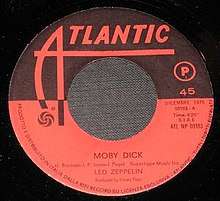Moby Dick (instrumental)
"Moby Dick" is an instrumental and drum solo by English rock band Led Zeppelin, featured on their 1969 album Led Zeppelin II. Named after the whale in the novel Moby-Dick by Herman Melville, it was also known by the alternate titles "Pat's Delight" (early 1968–1969 version with completely different guitar riff) and "Over the Top" (with "Out on the Tiles" intro section and original closing reprise) during various points of the band's career.
| "Moby Dick" | |
|---|---|
 Italian single label | |
| Instrumental by Led Zeppelin | |
| from the album Led Zeppelin II | |
| Released | 22 October 1969 |
| Recorded | 1969 |
| Studio | Mirror Sound, Los Angeles |
| Genre | |
| Length | 4:25 |
| Label | Atlantic |
| Composer(s) | |
| Producer(s) | Jimmy Page |
Composition and recording
The tune emerged after Led Zeppelin guitarist and producer Jimmy Page would often catch drummer John Bonham jamming or improvising in the studio, recorded parts of his solos and pieced it all together. The beginning and end of the song feature a power trio of Bonham, Page and bassist John Paul Jones performing a 12 bar blues riff in Drop D tuning, leaving the remainder of the song open for Bonham alone. The structure of the main riff is that of the twelve-bar blues. Singer Robert Plant did not sing at all and in concert would simply introduce Bonham to the audience before the tune started. Studio outtakes from the Led Zeppelin II sessions reveal that the drum solo recorded was edited down from a much longer version.[4]
The guitar riff can be traced back to the BBC unused session track "The Girl I Love She Got Long Black Wavy Hair" which was recorded in the summer of 1969.[4] The riff is also similar to that of Bobby Parker's 1961 single, "Watch Your Step", although the progression is in a different key and tempo.[5]
Live performances
Bonham's drum solo was often played at Led Zeppelin concerts from the first North American tour in November 1968, being his solo performance showcase on concert tours through 1977. Over this period it went through three different name changes. During their early 1968–1969 tours it was known as "Pat's Delight" (a reference to Bonham's wife), from 1969–1975 it was "Moby Dick" and during Led Zeppelin's 1977 North American Tour it was "Over the Top" as the solo began with the opening riff to "Out on the Tiles" before segueing into a lengthy drum solo (in the same time ending with a "Moby Dick" riff).[4] The last time "Moby Dick" was played by Led Zeppelin was on 17 July 1977 at the Seattle Kingdome and can be found on various audio and video bootleg recordings.
When played live, Bonham's drum solo would last as little as 6 minutes or, more frequently, as long as 30 minutes, while the rest of the band would leave the stage after having played the introduction.[4] During the performance Bonham would often set aside or throw his drumsticks into the audience and then continue the solo with his hands (sometimes drawing blood as a result).
Live versions of "Moby Dick" are included on the live album How the West Was Won (lasting 19:20, performed at L.A. Forum 25 June 1972) and on Led Zeppelin's 1976 concert film, The Song Remains the Same as part of Bonham's fantasy sequence. It was also included on the film's accompanying soundtrack. Both of them were cut to a shorter version. The Led Zeppelin DVD also has a 15-minute-long version that was performed and recorded at the Royal Albert Hall in 1970.
See also
References
- Eiding, Joachim (2012). Der Ochse in der Roggensemmel und andere Musikanekdoten (in German). ISBN 978-3-9560-0998-3.
- Popoff, Martin (2014). The Big Book of Hair Metal: The Illustrated Oral History of Heavy Metal's Debauched Decade. Voyageur Press. p. 11. ISBN 978-0-76034-546-7.
...plus other influential hard rock tracks "Heartbreaker," "Living Loving Maid (She's Just a Woman)," "Moby Dick," and "Ramble On."
- Tucker, Dan (28 February 2014). "13 Classic Hard Rock Songs That Will Make You Scream "More Cowbell!"". VH1. Retrieved 1 August 2016.
- Lewis, Dave (1994). The Complete Guide to the Music of Led Zeppelin. Omnibus Press. ISBN 0-7119-3528-9.
- Newman, Martin (November 2010). "One Step from the Blues". Record Collector (381). ISSN 0261-250X.